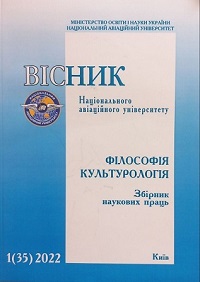ТРАНСФОРМАЦІЇ ПРИНЦИПІВ ГУМАНІЗМУ ТА ВІДПОВІДНОСТІ В КОНТЕКСТІ СУЧАСНОЇ ЕКОЛОГІЧНОЇ ЕТИКИ І КОНЦЕПЦІЇ СТАЛОГО РОЗВИТКУ
DOI:
https://doi.org/10.18372/2412-2157.35.16571Ключові слова:
природа, екологічна етика, екологічна криза, глобальні проблеми людства, концепція сталого розвитку, гуманізм, антропоцентризм, біоцентризм, соціальна відповідальність, корпоративна соціальна відповідальність, індустрія модиАнотація
У статті досліджуються питання сучасної екологічної етики, в яких запропонований новий погляд на
природу взаємин між людьми та природою. Відстежується трансформація етичного принципу гуманізму в ракурсі
вирішення глобальних проблем людства. З’ясовуються значущі філософсько-наукові концепції екологічної орієнтації,
що складають методологічну та категоріальну основу сучасної екологічної етики і соціальних уявлень про
гармонійне суспільне управління. Наводяться конкретні приклади корпоративної соціальної відповідальності в межах
екологічного тренду. Практика переорієнтування етики бізнесу у бік екологічних зобов’язань, на думку автора,
засвідчує подальшу легітимацію в суспільній свідомості цінностей біоцентризму і, навпаки, відхід від класичної
просвітницької моделі антропоцентризму. Проте автор не згодний з крайнім протиставленням цих двох установок
і скоріше схильний шукати на їхнє «примирення».
Посилання
Chan Emily. Що мас-маркет готовий робити заради екології
// Vogue 02.08.2019. URL: https://www.vogue.ru/fashion/
news/chto_mass_market_gotov_delat_radi_ekologii
Corporatesocialresponsibility (CSR) - definition,
historyandevolution. Youmatter [definitions]. Lastmodifiedon 3rd
March 2020. URL: https://youmatter.world/en/definition/csr-definition/
Fox Michael W. The "Values" of Sentient Beings. Betweenthe
Species 1989. Vol. 5: Iss. 3, Article10. Summer. P. 158-159.
Friedman, M. The Social Responsibility of Business
IstoIncreaseIts Profits. In: Zimmerli, W.C., Holzinger, M., Richter, K.
(eds) Corporate Ethicsand Corporate Governance. Berlin, Heidelberg,
Pp. 173–178. URL: https://doi.org/10.1007/978-3-540-70818-
_14
Jana Rosalind. Чому модна індустрія розлюбила
натуральнее хутро // Vogue 25.11.2019 URL: https://www.vogue.ru/
fashion/pochemu-modnaya-industriya-razlyubila-naturalnyj-meh
Litvinova A. H&M представил коллекцию из апельсинового
шелка и ананасовой кожи //Модная сеть. 06.04. 2019 URL:
https://fashionnet.ru/news/h-m-predstavil-kollektsiyu-iz-apelsinovogoshelka-
i-ananasovoj-kozhi/
MankindattheTurningPoint. The Second Report To The Club of
Rome [Mesarovic, Mihajlo; Pestel, Eduard]. – London. –
Hutchinson&Co, 1975, 210 p.
Авдеева И. А. Трансформации гуманизма: от
антропоцентризма к биоцентризму в контексте построения новых
принципов отношения человека к животным / И. А. Авдеева //
Философия и общество. 2018. № 3. С. 66-82.
Йонас Г. Принцип відповідальності. У пошуках етики для
технологічної цивілізації / Г. Йонас; пер. з нім. К.: Лібра, 2001.
с.
Матюхіна О. А. Життя як найвища цінність буття – провідна
ідея філософії Альберта Швейцера / О. А. Матюхіна // Вісник
Національного авіаційного університету. Філософія. Культурологія.
№ 2. С. 47-51. URL:
http://nbuv.gov.ua/UJRN/Vnau_f_2013_2_12
Моисеев Н. Н. Экология в современном мире /
Н. Н. Моисеев // Наука и жизнь. – 1998. № 3. – С. 4-18.
Павлова Т. Н. Биоэтика в высшейшколе: учеб. пособие для
вузов. М.: МГАВМиБ, 1997.147 с.
Перец И. Е. Экологическая ответственность предприятий
индустрии и моды / И. Е. Перец, Е. А. Майорова //
предпринимательство и корпоративная социальная
ответственность. – 2021. – Том 2, № 1. – С. 29-50.
Сахарова Е. Зеленая корпорация: 13 экологических
инициатив H&M // Re Cycle. 19.06.2014 URL: https://recyclemag.ru/
article/zelenaja-korporatsija-hm
Скиба І. П. Сталий розвиток як соціокультурний розвиток /
І. П. Скиба // Вісник Національного авіаційного університету.
Серія: Філософія. Культурологія. Київ, 2020. – № 2 (32). – C. 128-
Станковская В. H&M запускает сервис аренды одежды
//Retail.ru. 05.12. 2019, 13:09 URL: https://www.retail.ru/news/h-mzapuskaet-
servis-arendy-odezhdy-5-dekabrya-2019-188822/
Теория государства и права: курс лекций / под ред. Н. И.
Матузова и А. В. Малько. 2-е изд., перераб. и доп. М.: Юристъ,
776 с.
Швейцер А. Культура и этика: монографія / А. Швейцер;
пер. с нем; общ. ред. и предисловие В. А. Карпушина. – М.:
Прогресс, 1973. – 343 с.


